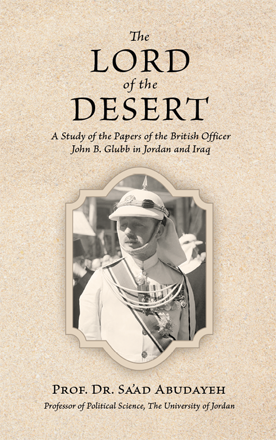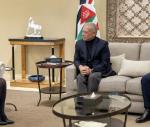You are here
‘The Lord of the Desert’ book examines role of Glubb Pasha in Jordan, Iraq
By JT - Oct 24,2022 - Last updated at Oct 24,2022

“The Lord of the Desert: A Study of the Papers of the British Officer John B. Glubb in Jordan and Iraq”, a new book by Sa’ad Abudayeh and published by Westphalia Press (Photo courtesy of Sa’ad Abudayeh)
AMMAN — John Bagot Glubb was one of the most prominent British officers who served in Jordan, leading and training Transjordan’s Arab Legion between 1939 and 1956.
Glubb (1897-1986) is credited with establishing the Camel Corpse, or the Desert (Badia) Force, which was the striking force of the army and continues to serve in the Jordanian Armed Forces until today.
The role of Glubb during his military service in the region comes under scrutiny in “The Lord of the Desert: A Study of the Papers of the British Officer John B. Glubb in Jordan and Iraq”, a new book authored by Sa’ad Abudayeh and published by Westphalia Press.
Abudayeh is a Jordanian scholar, educated at Penn State University, who has written numerous books and articles on Jordan’s political and social history, according to a statement made available to The Jordan Times.
Glubb, more known in Jordan as Glubb Pasha, was sent by Britain to Iraq in 1920 to deal with problems following the Iraqi revolt, after which he stayed in the country for 10 years working with Bedouins and learning spoken Arabic from Iraqi tribes.
“Glubb came to Iraq a volunteer in 1920. He was responsible for a small bridge on the River Euphrates and started mixing with the Dlaym clans,” according to the book.
“The British needed signal officers to guide the plans which bombed the rebel clans, so they resorted to Glubb,” the book said.
In 1930, he was moved to Jordan where he stayed for the next 26 years, serving with three late Hashemite kings: King Abdullah I, King Talal and King Hussein.
His most important asset in Jordan was his ability to understand the unique Jordanian culture and environment, thus inventing what Abudayeh calls in his book “the diplomacy of the desert”, leading to the establishment of the Badia (Desert) Force.
According to Abudayeh, this force played a key role in helping Jordan’s neighbouring states during World War I.
Due to his understanding of Bedouin life and culture, Glubb established two mobile schools that were on the move with nomadic tribes, according to Abudayeh, who said that his closeness to the Bedouins and local soldiers was an element that helped him achieve many successes.
Unfortunately, despite his “successes” he was fired and evacuated from Jordan in 1956, becoming a scapegoat of political developments at the time, according to Abudayeh, who teaches political science at the University of Jordan.
Abudayeh was decorated for his cultural role in Jordan by His Majesty King Abdullah II, according to the statement.
Related Articles
AMMAN — His Majesty King Abdullah received on Wednesday cables of congratulations from senior officials and officers on the occasion of the
His Majesty King Abdullah on Saturday received cables of congratulations from senior officials and officers on the 59th anniversary of the Arabisation of the Jordan Armed Forces-Arab Army (JAF) which is marked on March 1.
AMMAN — Tuesday marks the 67th anniversary of the Arabisation of the leadership of the Jordan Armed Forces-Arab Army (JAF).















